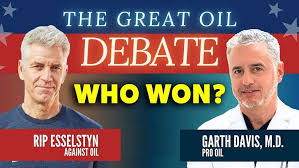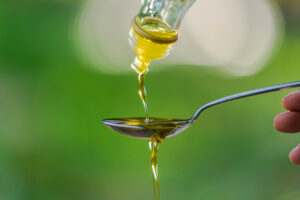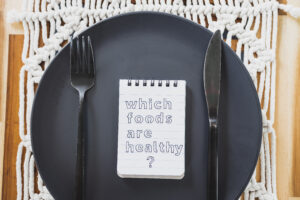In March 2025, Forks Over Knives hosted an online event called “The Great Oil Debate.” The panelists included Rip Esselstyn (anti-oil) and Dr. Garth Davis (pro-oil). (The video link can be found below).
Having studied for decades under doctors who support an oil-free diet, I was curious to learn more about this emerging research that was compelling a few plant-based doctors to now recommend olive oil to their patients.
In a nutshell, the two men respectfully debated studies that promote the consumption of olive oil; whether or not oils are inflammatory; whether or not oils damage the endothelial lining of our arteries; and whether or not oil is a healthy food.
Dr. Davis’s position is that extra virgin olive oil (EVOO) should be a part of a healthy diet, and he recommends 1.5 TBS/daily to his patients. He says that cold-pressed EVOO has high levels of polyphenols and antioxidants which fight oxidation and inflammation, two contributors to heart disease. He also asserted that EVOO is associated with weight loss (as compared to regular olive oil), which might have to do with how the polyphenols affect the gut microbiome. Dr. Davis stated there may be a little bit of 'magic' in EVOO that you wouldn't get from a whole olive, but he cannot prove that since no studies exist which compare the effects of olive oil versus whole olives on the endothelial lining. Do we HAVE to consume oil to be healthy? Dr. Davis said no, but it tastes great and is a great way to prepare food. He later added it will make your diet healthier.
Rip Esselstyn’s position is that there are much smarter ways to get our polyphenols than at the expense of calorically dense oils; he also countered that oils contain very few antioxidants and in trace amounts. He explained how EVOO increases LDL cholesterol (the lethal type) and commented that believing olive oil is a Mediterranean Wonder Elixir in which the polyphenols will overrule the 14% saturated fat is a dangerous game. He reported that The American College of Cardiology and the AHA recommend no more than 5-6% of calories from saturated fat; Americans are currently eating twice that, 10-12%, largely due to olive oil. He pointed out that in the PREDIMED study, every group of participants went on to experience major cardio events (even the oil group, see below section), and 273 developed diabetes. Rip said he dislikes singling out a single food as healthy or unhealthy, and that much depends on a person's health status and total diet.
The CORDIOPEV Study
After watching the debate twice and taking detailed notes, I decided to start digging into the research myself. I started with the CORDIOPREV study mentioned by Dr. Davis, which was conducted in Spain and shows benefits to the consumption of a Mediterranean diet with olive oil as compared to a low-fat diet.
Briefly, the participants had already experienced some form of heart disease in the past, making this a ‘secondary’ study. They were given a baseline IMT-CC test (an ultrasound which detects the thickness of the two inner layers of the common carotid artery), and they were asked to track their food intake using a 14-point questionnaire called the “Mediterranean Diet Adherence Screener.” Those who did not drop out of the study for various reasons were evaluated again after 5 years and 7 years.
Several red flags became apparent.
If you’ve followed my website for any length of time, you may be aware of the #1 tip when it comes to evaluating research, which is “who is making the claim, and who funded the study?”
The first sponsor listed in the CORDIOPREV study is the Olive Communal Heritage Foundation, an organization dedicated to “implementing initiatives that benefit the entire olive sector.” Their purpose, according to their website, is to guarantee the maximum and best exploitation of the Spanish Olive sector that collaborates in the defense, promotion, and management of the collective interest of all those who make up this important sector of our economy.
So, the people who funded this study are the same people guaranteeing the maximum promotion of olives. Big red flag.
Was it Really Low-Fat?
Another red flag is the claim that a “low-fat” diet was used in the comparisons. According to the study, the Mediterranean diet was 35% fat (meaning 35% of the calories in the diet were coming from fat); and the “low-fat” group was 28% fat (with the goal to stay under 30%).
Sorry, but a nearly 30% fat diet is NOT a low-fat diet! Technically, both diets were high in fat.
A truly low-fat diet would be what the credible experts in the plant-based world have proven to work effectively for decades: 10% - 15% of calories from fat. The McDougall Program is under 10% fat, and Dr. Esselstyn’s plan is even less. For reference, the American Cancer Society promotes 20% dietary fat, while the World Health Organization advocates for 15%. Again, a diet consisting of nearly 30% fat is not low-fat.
Side Note: For those who prefer to track their fat intake by the number of fat grams they consume, a low-fat diet would average roughly between 22 and 27 grams of fat per day (depending on your calorie intake). Following Dr. Davis’s advice to consume 1.5 TBS of oil daily would provide a whopping 21 grams of fat.
Other concerns about the study surfaced for me, too; the comparison models, the dietary guidelines (only the oil group was advised to have a low intake of red/processed meats and pastries/commercial bakery products), the accuracy of self-reported questionnaires for years, the other studies being referenced which don’t seem to back up their claims, and the fact that the study did not show any difference in the NUMBER of arterial plaques after either dietary intervention.
The PREDIMED Study
The PREDIMED study (referenced by both Dr. Davis and Rip) enrolled 7447 participants in Spain who were overweight, or smoked, or had diabetes or other risk factors for arterial disease. The study was paid for by the olive oil and nut producers in Spain, as well as the California Walnut Commission, all of whom stood to benefit from the results.
Participants were randomly assigned to follow one of three groups: a Mediterranean diet with nuts, a Mediterranean diet with olive oil, or a ‘low-fat’ diet.
Once again, there were no participants actually following a low-fat diet; the people assigned to the low-fat group reduced their fat intake from 39% to 37% fat, an insignificant amount, and definitely not low-fat.
All three groups were essentially consuming rich, calorically dense food, and liberal amounts of alcohol. It’s not surprising that not one of the subjects in the entire study lost weight. Plus, most were taking statin drugs, blood pressure drugs, or drugs for diabetes, and there were no reductions in medications.
And, as is often the case, the results were reported in relative numbers, rather than absolute numbers (which makes studies look far better than they really are). For example, during the time of the study, a total of 288 cardiovascular events occurred: 96 events in the oil group (3.8%), 83 events in the nut group (3.4%), and 109 events in the ‘low fat’ group (4.4%). In absolute terms, the people eating olive oil experienced a risk reduction of only 0.6%; those eating nuts had a 1% reduction in risk.
The study was later retracted when a British anesthesiologist named John Carlisle suspected that the participants in the study were not being randomized properly, and it turned out he was right. Articles are retracted when it is learned that the results are no longer reliable, to the point they cannot be corrected.
According to Dr. Pam Popper of Wellness Forum Health, who’s been teaching how to evaluate research for decades, the authors of the original paper issued a corrected version that showed only a correlation between the Mediterranean diet and better health outcomes; the corrected version could not claim that the diet caused better health outcomes. This significant difference essentially negates the claims made in the original study.
The Real Issue: Researchers for Hire
For anyone planning to include more olive oil in their diet as a result of these studies or Dr. Davis's recommendations, may I strongly encourage you to watch this informative video hosted by Jeff Nelson, a research analyst and well-known investigative reporter in the plant-based arena.
Titled Great Olive Oil Debate - Rip vs. Garth - WHO WON?, the video features Jeff Nelson and Dr. Peter Rogers discussing the science in greater depth and highlighting some concerning facts:
- Dr. Rogers breaks down the biochemistry of how all oils, including olive oil, impair blood flow, raise triglycerides, and contribute to high blood pressure, diabetes, atherosclerosis, heart attacks, atrial fibrillation, congestive heart failure, and clogged arteries to the brain.
- The food industry, over the last 30 years, has figured out how to ‘work the system’ to their favor by finding researchers and doctors who will provide favorable results. (I would add: That’s why ‘older research’ is often more credible and should never be dismissed.)
- The key studies Dr. Davis cites, like PREDIMED, are riddled with methodological issues and industry influence.
- Dr. David Katz, whom Davis quotes frequently, has received major funding from olive oil industry groups. (see video link below)
- The Greek population is heavier today than ever while eating the Mediterranean diet. Body fat tissue tests reveal that 55% of that fat is olive oil.
- Dr. Rogers: We shouldn’t be asking where we’ll get our ‘good fats.’ We’ll get all the fats we need from a whole food plant-based diet, which are filled with fiber that convert fats properly in the colon so there’s no risk of leaky gut.
- Dr. Rogers shares findings on contaminants like lead and phthalates found in many commercial olive oils.
It’s NOT a Toss-Up
Jeff Nelson argues it is NOT a toss-up when it comes to oils; in fact, he’s surprised there’s even a debate. Some topics ARE debatable, but this is not one of them. According to Jeff, the science has not changed. The best results are STILL coming from the old school doctors who never sold out. Dr. Rogers points out the the only reason we're having a debate is because big money is involved.
To quote Jeff Nelson from his YouTube show notes:
The most dramatic disease reversal results - Esselstyn, McDougall, Ornish, Kempner - have consistently come from very low-fat, oil-free diets. These aren’t mild improvements; we’re talking about people sent home to die by cardiologists who are still thriving decades later. While Dr. Davis makes thoughtful points about helping people take small steps, Peter and I explain why we remain firmly in the oil-free camp - for those serious about reversing disease and achieving optimal health.
Final Thoughts
It’s possible to find a study to support any position out there. That’s why we should always look at independent research (free of industry funding) and consider the entire body of evidence as opposed to a handful of studies…. especially if we’re going to base our health decisions on it.
The olive oil industry is heavily funding and influencing the research in question. As Jeff Nelson points out in his video, the researchers in all these studies are the same group of people; and they’re in business with the olive oil industry.
Nothing in this debate convinced me that consuming pure isolated liquid fat is a healthy thing to do. Not even close. Promoting oils to a population that is nearly 75% overweight or obese is, in my opinion, irresponsible. Not to mention that heart disease remains our #1 killer - with a high-fat diet being a culprit. It appears to me that certain doctors (and well-known organizations) are 'selling out' for various reasons I won’t expand on here.
I’m not sure how many people will change their eating patterns based on this debate. Those who already follow a low-fat, plant-based diet will be assured they’ve made a good choice. Those who believe that consuming oils on a regular basis is necessary for good health will continue to do so, despite the poorly designed studies with inherent conflicts.
The debate is not about Rip versus Garth, or Jeff Nelson versus Dr. Katz. We should never base our health decisions on the advice of one or a few experts. It really boils down to the three things: the credibility of the research being touted, the overall body of unbiased evidence, and the decades-long results achieved by our pioneer doctors which are proven to actually reverse disease (not just improve biomarkers or slow disease progression).
May I encourage you to read the studies for yourself to reach your own informed conclusions. The best thing about the debate is that it DID prompt me to spend hours digging into the studies even deeper, and for that I’m grateful; it only solidified my reasoning to continue following the oil-free plan I’ve enjoyed for years.
One last thing. The consumption of oils seems to be a controversial topic. You may have a totally different take on all this, and that’s OK. It's my hope we can agree to disagree and still be friends.
PS: In over 25 years of helping people, I have never seen this oil-free lifestyle not benefit those who fully stick with it. And you’re never too old or too sick to begin. I’m here to help. Book a complimentary call if you’d like to talk it over.
LINKS:
The Great Oil Debate with Rip and Garth
Jeff Nelson and Dr. Peter Rogers – The Great Oil Debate, Who Won?
Jeff Nelson - Forks Over Knives Isn't What It Used to Be
Oils – What You Should Know (Cyd’s Website)
Tips to Evaluate What You Hear or Read
Dr. Katz’ financial ties to the Olive Oil Industry
Subscribe to our weekly newsletter




